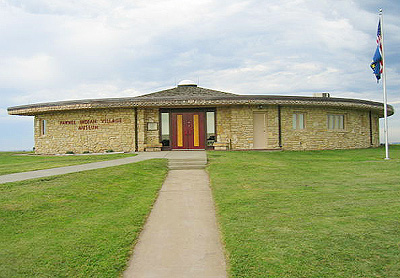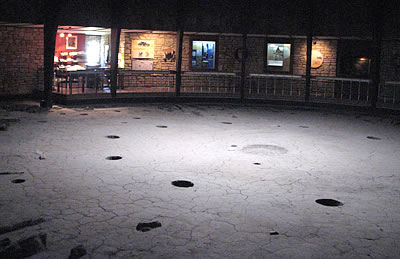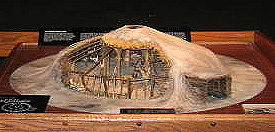
|
courtesy Pawnee Indian Museum State Historic Site
|

|
courtesy of Keith Stokes
|

|
|
courtesy Pawnee Indian Museum State Historic Site
|
Pawnees were the dominant power on the Central Plains. Their territory
included large areas of present-day Kansas and Nebraska.
In the early
1800s Pawnees numbered between 10,000 and 30,000. There were four
separate bands, and each functioned independently.
This large fortified village of the Kitkehahki (Republican) Pawnees was occupied in the late 1700s and possibly again in the 1820s and was home to as many as fifteen hundred people, in this
area
located in present day Republic County. The Pawnees lived in forty to
fifty earth lodges during the spring and fall. Thousands of dogs and
hundreds of
horses lived with them. In winter and summer, they traveled through
what is now western Kansas living in tipis and following the buffalo.
By 1830 wood became scarce and the land was no longer productive. The
village was abandoned and the band moved north, closer to other
Pawnees. The village later burned to the ground.
In 1901 about half of the original village site was deeded to the State
of Kansas for preservation. The other half had been destroyed by
pioneer farming.
The historical significance of this village prompted the Kansas State
Historical Society to excavate a portion of it in the 1960s. In 1967 a
museum was actually built over one of the big lodge earthen floors from
the
1820s village. It had been a round house fifty feet in diameter and
maybe housed 40-50 extended family members. As you gaze across the
excavated floor you'll see the ashes are still in the fireplace,
postholes are still visible, bone hoes are on the floor and burned
corn, trade hoes, and tool-making equipment are all at rest just the
way they were found. The grounds outside the museum are dotted with the
imprints of other lodges and
numerous artifacts inside the museum tell the story of the powerful
Pawnee Nation.


